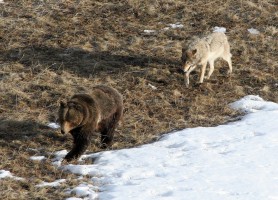Wolves and grizzlies are now part of the landscape in northeast Washington (Doug Smith).By Bob Ferris
People who teach in a classroom understand that the game is won or lost and the tone set extremely early in the process. Setting and communicating clear boundaries and expectations on that first day of class can help head off problems and save a lot time and energy on corrective actions. By this measure, the Washington State Department of Fish and Wildlife (WDFW) and their governing commission failed the Wedge Pack and also failed the public who expects that the agency—first and foremost—to protect the interests of the wildlife under their care.
The fact that WDFW field staff seemed unclear about procedures and policies, everyone except gas station attendants appeared to be verifying wolf depredation claims and agency’s strategy of not answering the phone and pretending to not be home when the concerned and angry public called only added to the Keystone Cop-nature of this whole affair. In short, through all these actions WDFW has seriously lost the public’s confidence and either needs to make some massive changes or find new leaders that can.
What kind of changes? First, the agency has to bend over backwards to rebuild trust with the public and remember that WDFW is in the business of species recovery not looking for ways to placate a recalcitrant and generally uncooperative public lands rancher. There is another state agency that looks after the rancher very well, thank you.
Then WDFW also needs to go back to square one—or day one—in terms of making sure that appropriate expectations are set and the infrastructure is there to forward wolf recovery. This will be tough because the agency has already shown itself to lack a certain level of gumption when it comes to dealing with the ranching community. Since the agency has been tested and failed, push back will happen and WDFW will just have to push back harder and stronger. This probably requires a new team—in short—a new sheriff has to come to town.
The public lands grazing aspect of this and the responsibility of leaseholders to undertake preventative measures and practice proactive stewardship may seem like a sideshow, but it is central to the problem. The cattle industry has occupied the throne on public lands for a long time and many still embrace a romantic view of cowboys—including me occasionally. But that inertia and those emotions have to be balanced with facts and reality particularly as we look at actions on our public estate.
The last figures I reviewed peg the taxpayer costs of public lands grazing in the West at a cool $100 million annually. Grazing fees on public lands are much, much lower than those on private. Add to those costs the environmental impacts of grazing from degraded habitat and water quality that translate directly into fewer elk and deer plus less fish and song birds to diminished recreational opportunities on our wildlands. I respect and often like ranchers, but in a multi-use setting there can be no kings or fiefdoms and all public lands users have to act responsibly. And given that hunting, fishing, and wolf-oriented tourism are all economic engines in their own rights, it really begs the question of whether we can or should still treat these lands as some sort of subsidized bovine day care facility for a handful of ranchers. This needs to be examined fully and acted on.
To address the above the agency needs to insist—particularly on public lands—that ranchers make sure they are doing everything possible to stem potential problems. Conditions have changed with the natural arrival of the wolf and ranchers can no longer expect to just dump their cattle at the beginning of the season and pick them up at the end. WDFW needs to simultaneously set expectations and also offer training and assistance. And ranchers need to remember that the original public lands grazing fees were set lower because these were lands where conditions such as predation would be higher.
People in Washington State and around the world are deeply saddened by the loss of the Wedge Pack—particularly so—because this was a tragedy that could and should have been avoided. The agency likely saved themselves from embarrassing court time through some last minute adjustments, but in the court of public opinion the judgment is strongly and painfully against them. To satisfy that judgment, WDFW needs to remember and be true to all aspects of their mission, vision and goals (see here) and get to the job of recovering wolves, because the “class” is currently out there shooting spit wads and paperclips and it has to stop now.
Take action in Washington on October 5th:
Washington Fish and Wildlife Commission Meeting on Wolves: Please Participate on Oct 5 (please note change of venue)
Please See Related Posts:
